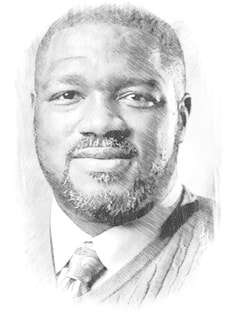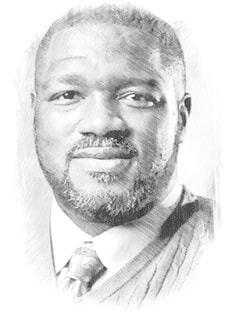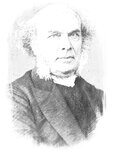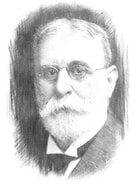Ephesians 2
|
Ephesians 2:1-3:
And you He made alive, who were dead in trespasses and sins, in which you once walked according to the course of this world, according to the prince of the power of the air, the spirit who now works in the sons of disobedience, among whom also we all once conducted ourselves in the lusts of our flesh, fulfilling the desires of the flesh and of the mind, and were by nature children of wrath, just as the others. |

Warfare against spiritual evil is threefold: we wrestle not only against Satan but also against the world and our flesh. Paul argued, “…you previously walked according to the ways of this world, according to the ruler of the power of the air, the spirit now working in the disobedient. We too all previously lived among them in our fleshly desires, carrying out the inclinations of our flesh and thoughts, and we were by nature children under wrath as the others were also” (Ephesians 2:2–3). Spiritual warfare is not simply a conflict with demonic forces. Because the world is fallen, we too fight against ungodly structures, like the human trafficking and pornography industries. Because of our sinful nature, we also fight against our heart’s inclination to lust, boast, and deceive. Spiritual warfare is submitting unseen evil, unjust systems, and our latent sins to the gospel’s power. -Kyra Riley; Daily Grace; How to Engage in Spiritual Warfare
|
"Before an individual can be saved, he must first learn that he cannot save himself."
—M. R. DeHaan, M.D. (1891-1965)
—M. R. DeHaan, M.D. (1891-1965)

Christian Nationalism can find some support for its views in the Old Testament, but it fails to take into account the political theology of Jesus and the apostles. A complete survey of the New Testament reveals that the apostles dealt with theological disputes through the church, apart from government action. Consider the strong language the apostle Paul used of the false teachers in Corinth. The context of the passage is Paul’s stinging reply to the “super-apostles” who charged Paul with preaching an unauthorized gospel given to him by men. In response, Paul had no hesitation in using this language of his critics: “So it is no surprise if [Satan’s] servants, also, disguise themselves as servants of righteousness. Their end will correspond to their deeds” (2 Cor 11:15). Despite unmasking these churchmen as Satan’s servants, he never advocates turning them over to the authorities for punishment, though clearly, the issues at stake in Corinth were matters of eternal significance. In those days, professing Christians suffered persecution from Jewish authorities and, increasingly, the Roman Empire. If Paul viewed theological disputes as being within the legitimate purview of the state, he could have easily suggested that the Corinthian Christians turn these false teachers over to the Jewish leaders or Roman authorities. He doesn’t.
Perhaps the most significant teaching relevant to this discussion is recorded in Matt 19. In the preceding verses, the Pharisees had been told by Jesus that in the marital union, husband and wife are joined together by God as one flesh: therefore man should not separate what God joined. They respond by asking why Moses allowed them to divorce their wives at will. Jesus responds, “Because of your hardness of heart Moses allowed you to divorce your wives, but from the beginning, it was not so. And I say to you: whoever divorces his wife, except for sexual immorality, and marries another, commits adultery” (Matt 19:8-9).
Jesus makes it clear that, even in theocratic Israel, God made legal exceptions for certain immoral activities, here, illegitimate divorce (Matt 5:32). This was done because of the hardness of the Israelites’ hearts.
This concession is relevant to the discussion of Christian Nationalism. If even in theocratic Israel certain sins were tolerated by the government because of the people’s hardness of heart, it would seem even more appropriate that we who live under the new covenant begun by Christ should tolerate some sins and theological errors because of a similar hardness. I would argue that external religious practice would fall under this category. Religion is one of the things people keep closest to their hearts, and is the most difficult thing to change, even under threat of government action. Ephesians 2:1 describes unbelievers as being dead in their sins. Isn’t this the epitome of a hard heart? Arguing from the principle of the lessor-to-the-greater, if divorce was allowed because of hardness of heart, shouldn’t the exercise of false religion be as well?
There are very practical dangers to a Christian government that punishes the practice of heretical views through state action. The likely result of forcing heresy underground and creating a black market of ideas instead of addressing falsehood head-on in the open debate should concern Christians thoughtfully considering these issues. Giving the government the power to determine what is and what is not heresy can also have dangerous consequences, as seen in the Inquisition, witch trials, and numerous examples of abuse of power. Even today Christian churches disagree on theology and morality and who can say that the brand of Christianity the nationalist state supports is your brand?
Pragmatic reasoning aside, Christ and His apostles teach that false doctrine and unbelief, while serious matters, are things that should be left out of the government’s hands. If we wish to apply the Bible’s teachings faithfully in this subject, we should repudiate Christian Nationalism and seek a better way to address the issues plaguing modern society.
--Mason Dees; Religious Liberty TV; The Popularity and Pitfalls of Christian Nationalism 8.21.23
Perhaps the most significant teaching relevant to this discussion is recorded in Matt 19. In the preceding verses, the Pharisees had been told by Jesus that in the marital union, husband and wife are joined together by God as one flesh: therefore man should not separate what God joined. They respond by asking why Moses allowed them to divorce their wives at will. Jesus responds, “Because of your hardness of heart Moses allowed you to divorce your wives, but from the beginning, it was not so. And I say to you: whoever divorces his wife, except for sexual immorality, and marries another, commits adultery” (Matt 19:8-9).
Jesus makes it clear that, even in theocratic Israel, God made legal exceptions for certain immoral activities, here, illegitimate divorce (Matt 5:32). This was done because of the hardness of the Israelites’ hearts.
This concession is relevant to the discussion of Christian Nationalism. If even in theocratic Israel certain sins were tolerated by the government because of the people’s hardness of heart, it would seem even more appropriate that we who live under the new covenant begun by Christ should tolerate some sins and theological errors because of a similar hardness. I would argue that external religious practice would fall under this category. Religion is one of the things people keep closest to their hearts, and is the most difficult thing to change, even under threat of government action. Ephesians 2:1 describes unbelievers as being dead in their sins. Isn’t this the epitome of a hard heart? Arguing from the principle of the lessor-to-the-greater, if divorce was allowed because of hardness of heart, shouldn’t the exercise of false religion be as well?
There are very practical dangers to a Christian government that punishes the practice of heretical views through state action. The likely result of forcing heresy underground and creating a black market of ideas instead of addressing falsehood head-on in the open debate should concern Christians thoughtfully considering these issues. Giving the government the power to determine what is and what is not heresy can also have dangerous consequences, as seen in the Inquisition, witch trials, and numerous examples of abuse of power. Even today Christian churches disagree on theology and morality and who can say that the brand of Christianity the nationalist state supports is your brand?
Pragmatic reasoning aside, Christ and His apostles teach that false doctrine and unbelief, while serious matters, are things that should be left out of the government’s hands. If we wish to apply the Bible’s teachings faithfully in this subject, we should repudiate Christian Nationalism and seek a better way to address the issues plaguing modern society.
--Mason Dees; Religious Liberty TV; The Popularity and Pitfalls of Christian Nationalism 8.21.23
 Voddie Baucham
Voddie Baucham
Being a son of something involves being born with its traits.
Paul writes of "the course of this world." The Greek word kosmos, translated into the English word "world," essentially means an "orderly system." To human eyes beholding all the activity throughout the earth, the world looks anything but orderly. It looks confusing, to say the least. However, that conclusion depends on one's perspective.
What is going on to discerning eyes, the eyes of one to whom God has revealed Himself, is an orderly system of deception cloaked by restless activity among humans involved in constant wars, thousands of religions, evil conduct, corrupting entertainments, and other distracting, time-wasting business and social vanities. All of this restless activity is in reality nothing but a smokescreen hiding a sinister influence from discovery.
Notice something to which we generally do not pay much attention. The word "world" appears as the object of the preposition "of." This prepositional phrase modifies "course," showing us that Paul is speaking of a specific "course" available to us to choose from among others. The Greek word translated "course," aion, is especially interesting. At first, it indicates "an age," "an indefinite period of time," and by extension, "perpetuity."
However, Vine's Dictionary of New Testament Words provides an interesting alternative, saying that it also means, "Time viewed in relation to what takes place during that period" (emphasis added). Aion, then, does not have to mean simply "time" in some form: Vine shows that it is correctly translated "place" in Hebrews 5:6. Other commentators go into greater detail, but we will quote only two highly respected ones that other commentators frequently cite as authorities.
First, Richard C. Trench is a resource virtually every commentator eventually quotes on the definitions of biblical words. He defines aion as: . . . all that floating mass of thought, opinions, maxims, speculations, hopes, impulses, aims and aspirations at any time current in the world, which is impossible to seize and accurately define, but which constitutes a most real and effective power, being our moral or immoral atmosphere which at every moment of our lives we inhale, again inevitably exhale.
Aion, translated as "course" in Ephesians 2:2, is the vague, ever-present immaterial realm that we are surrounded by and live in. It is interesting that Trench ties his definition to air, in that, even as we unconsciously breathe air in and out to sustain life, the course of the world is every bit as necessary to carnal life and is affecting us invisibly and constantly.
Second, Johann A. Bengel adds that aion is ". . . the subtle informing spirit of the Kosmos, or world of men who are living alienated and apart from God." This is what Germans termed zeitgeist, the spirit of the age—the "informing spirit"! The term "spirit" is used to indicate the invisible, immaterial influence whose characteristics are absorbed and then manifested in the attitudes and conduct of the general population of a given people.
An American commentator, Kenneth Wuest, is very helpful at this juncture: To distinguish between aion and kosmos, kosmos gives the over-all picture of mankind alienated from God during all of history, and aion represents any distinct age or period of human history as marked out from another by particular characteristics.
Course in Roget's International Thesaurus, under the heading "tendency," has such synonyms as "thoughts," "zeitgeist," "spirit," "disposition," "character," "nature," "makeup," "bent," "slant," "frame of mind," "attitude," "inclination," "mind-set," "drift," "perspective," and many more. It may be easier to understand "course of this world" by rephrasing it into statements such as, "according to the disposition of this world"; "according to the character of this world"; "according to the nature of this world"; "according to the makeup of this world"; "according to the mindset, drift, or perspective of this world." -Voddie Baucham
Paul writes of "the course of this world." The Greek word kosmos, translated into the English word "world," essentially means an "orderly system." To human eyes beholding all the activity throughout the earth, the world looks anything but orderly. It looks confusing, to say the least. However, that conclusion depends on one's perspective.
What is going on to discerning eyes, the eyes of one to whom God has revealed Himself, is an orderly system of deception cloaked by restless activity among humans involved in constant wars, thousands of religions, evil conduct, corrupting entertainments, and other distracting, time-wasting business and social vanities. All of this restless activity is in reality nothing but a smokescreen hiding a sinister influence from discovery.
Notice something to which we generally do not pay much attention. The word "world" appears as the object of the preposition "of." This prepositional phrase modifies "course," showing us that Paul is speaking of a specific "course" available to us to choose from among others. The Greek word translated "course," aion, is especially interesting. At first, it indicates "an age," "an indefinite period of time," and by extension, "perpetuity."
However, Vine's Dictionary of New Testament Words provides an interesting alternative, saying that it also means, "Time viewed in relation to what takes place during that period" (emphasis added). Aion, then, does not have to mean simply "time" in some form: Vine shows that it is correctly translated "place" in Hebrews 5:6. Other commentators go into greater detail, but we will quote only two highly respected ones that other commentators frequently cite as authorities.
First, Richard C. Trench is a resource virtually every commentator eventually quotes on the definitions of biblical words. He defines aion as: . . . all that floating mass of thought, opinions, maxims, speculations, hopes, impulses, aims and aspirations at any time current in the world, which is impossible to seize and accurately define, but which constitutes a most real and effective power, being our moral or immoral atmosphere which at every moment of our lives we inhale, again inevitably exhale.
Aion, translated as "course" in Ephesians 2:2, is the vague, ever-present immaterial realm that we are surrounded by and live in. It is interesting that Trench ties his definition to air, in that, even as we unconsciously breathe air in and out to sustain life, the course of the world is every bit as necessary to carnal life and is affecting us invisibly and constantly.
Second, Johann A. Bengel adds that aion is ". . . the subtle informing spirit of the Kosmos, or world of men who are living alienated and apart from God." This is what Germans termed zeitgeist, the spirit of the age—the "informing spirit"! The term "spirit" is used to indicate the invisible, immaterial influence whose characteristics are absorbed and then manifested in the attitudes and conduct of the general population of a given people.
An American commentator, Kenneth Wuest, is very helpful at this juncture: To distinguish between aion and kosmos, kosmos gives the over-all picture of mankind alienated from God during all of history, and aion represents any distinct age or period of human history as marked out from another by particular characteristics.
Course in Roget's International Thesaurus, under the heading "tendency," has such synonyms as "thoughts," "zeitgeist," "spirit," "disposition," "character," "nature," "makeup," "bent," "slant," "frame of mind," "attitude," "inclination," "mind-set," "drift," "perspective," and many more. It may be easier to understand "course of this world" by rephrasing it into statements such as, "according to the disposition of this world"; "according to the character of this world"; "according to the nature of this world"; "according to the makeup of this world"; "according to the mindset, drift, or perspective of this world." -Voddie Baucham
 Voddie Baucham
Voddie Baucham
We are all “by nature children of wrath” because we are all by nature sinners–for God’s wrath is not on a person unless they are a sinner and deserve that wrath. And since we are sinners by nature, we see that sin is not just something you do, it is something you are.
Dwelling on past sins in order to wallow in guilt or to revel in nostalgia is never a good idea, but Paul intends neither of these things when reminding readers of their condition before knowing Jesus (Eph. 2:1). Instead, the apostle wants to draw a contrast between life apart from Christ and life in Christ so as to magnify the power and grace of God in salvation. Laying the foundation for this contrast, the apostle continues describing life outside of Jesus in Ephesians 2:2–3, painting the bleakest of pictures for unredeemed sinners.
We were dead apart from Christ indeed (v. 1), but it was a state of spiritual death that did not render us incapable of action. We were all too capable of transgressing that which is holy, “following the course of this world . . . the prince of the power of the air . . . the passions of our flesh” (vv. 2–3). Here Paul reveals the three great powers that enslaved us completely before we knew Jesus and which we must continually rebel against in the course of our growth in holiness — the world, the flesh, and the Devil.
“The course of this world” (v. 2) refers to the ways of culture and society that oppose the Lord. There are ungodly trends in the world — materialism, naturalism, desire for instant gratification, and more — that once ruled all of our passions but are now defeated in Christ (John 16:33; 1 John 5:5). No longer our ruler, the world still appeals to our remaining sin, so we must maintain our guard lest we fall back into bondage.
In ancient times, the term air often referred to the spiritual realm of angels and demons; thus, “the prince of the power of the air” is Satan (Eph. 2:2). This leader of all that opposes God stirs up trouble all over the world, and he even endeavors to infiltrate and disturb the church (4:26–27). The Devil is fierce but easily put to flight when we resist him by the Spirit, as Jesus has triumphed over him (James 4:7; Col. 2:15).
Finally, “the passions of our flesh” and “desires of the body” (Eph. 2:3) refer not to our physical bodies, as if our corporeal form is in itself wicked. After all, God created all things good, including our bodies (Gen. 1:31). The apostle is speaking of our fallen nature, which Christ has subdued. It is a resilient foe, however, that remains until our glorification. We must therefore seek daily to mortify it and deny the sins that seem the most appealing to us (Rom. 6:12–14). --Voddie Baucham: The World, the Flesh, and the Devil
Dwelling on past sins in order to wallow in guilt or to revel in nostalgia is never a good idea, but Paul intends neither of these things when reminding readers of their condition before knowing Jesus (Eph. 2:1). Instead, the apostle wants to draw a contrast between life apart from Christ and life in Christ so as to magnify the power and grace of God in salvation. Laying the foundation for this contrast, the apostle continues describing life outside of Jesus in Ephesians 2:2–3, painting the bleakest of pictures for unredeemed sinners.
We were dead apart from Christ indeed (v. 1), but it was a state of spiritual death that did not render us incapable of action. We were all too capable of transgressing that which is holy, “following the course of this world . . . the prince of the power of the air . . . the passions of our flesh” (vv. 2–3). Here Paul reveals the three great powers that enslaved us completely before we knew Jesus and which we must continually rebel against in the course of our growth in holiness — the world, the flesh, and the Devil.
“The course of this world” (v. 2) refers to the ways of culture and society that oppose the Lord. There are ungodly trends in the world — materialism, naturalism, desire for instant gratification, and more — that once ruled all of our passions but are now defeated in Christ (John 16:33; 1 John 5:5). No longer our ruler, the world still appeals to our remaining sin, so we must maintain our guard lest we fall back into bondage.
In ancient times, the term air often referred to the spiritual realm of angels and demons; thus, “the prince of the power of the air” is Satan (Eph. 2:2). This leader of all that opposes God stirs up trouble all over the world, and he even endeavors to infiltrate and disturb the church (4:26–27). The Devil is fierce but easily put to flight when we resist him by the Spirit, as Jesus has triumphed over him (James 4:7; Col. 2:15).
Finally, “the passions of our flesh” and “desires of the body” (Eph. 2:3) refer not to our physical bodies, as if our corporeal form is in itself wicked. After all, God created all things good, including our bodies (Gen. 1:31). The apostle is speaking of our fallen nature, which Christ has subdued. It is a resilient foe, however, that remains until our glorification. We must therefore seek daily to mortify it and deny the sins that seem the most appealing to us (Rom. 6:12–14). --Voddie Baucham: The World, the Flesh, and the Devil
 James Davis
James Davis
The Scriptural passage chosen for today is found in Ephesians 2:4-5: “But because of His great love for us, God, who is rich in mercy, made us alive with Christ even when we were dead in transgressions—it is by grace you have been saved.” The early Christians at the Ephesus Church were reminded by the apostle that through the love and unmerited favor of God, we all have been spared from a justifiable death sentence. Jesus, God’s son, came to earth, lived, and died a horrible death on the cross for us. He arose and thereby provided the gift of salvation to all who will accept it. We who do choose to enter into covenant with God through His gift have been or will be saved and spared eternal separation from Him. We are assured that we will never be separated from the love of God through Christ Jesus. What a comfort to the Christian. Amen!
--James Davis; Magee News 11/19/23
--James Davis; Magee News 11/19/23
“A drowning man cannot be saved until he is utterly exhausted and ceases to make the slightest effort to save himself.” ― Watchman Nee, The Normal Christian Life
 Horatio Bonar
Horatio Bonar
“For we are not saved by believing in our own salvation, nor by believing anything whatsoever about ourselves. We are saved by what we believe about the Son of God and His righteousness. The gospel believed saves; not the believing in our own faith.”
― Horatius Bonar, The Everlasting Righteousness
“You contribute nothing to your salvation except the sin that made it necessary.”
― Jonathan Edwards
― Jonathan Edwards
 BB Warfield
BB Warfield
It is never on account of its formal nature as a psychic act that faith is conceived in Scripture to be saving. It is not, strictly speaking, even faith in Christ that saves, but Christ that saves through faith. The saving power resides exclusively, not in the act of faith or the attitude of faith or nature of faith, but in the object of faith. --BB Warfield
 BB Warfield
BB Warfield
There is nothing in us or done by us at any stage of our earthly development because of which we are acceptable to God. We must always be accepted for Christ’s sake or we cannot ever be accepted at all. This is not true of us only “when we believe,” it is just as true after we have believed. It will continue to be true as long as we live… It is always, on His “blood and righteousness” alone that we can rest. There is never anything that we are or have or do that can take His place or that take a place along with Him. We are always unworthy, and all that we have or do of good is always of pure grace. --BB Warfield; Miserable Sinners Christianity, Works, Vol. 7, Baker, 1931
|
|

From these verses we see the following about grace:
|
 Derek Prince
Derek Prince
Personally, I believe that only God Himself could conceive the method of achieving righteousness by faith. I believe that natural man, left to himself, would never have conceived such a way of achieving righteousness. To the best of my knowledge, every other major religion requires people to achieve righteousness by doing something. Different religions hold to different requirements, but, in essence, all of them think along this line: “I’ll be righteous if I do these things and don’t do those things.” This means that the Christian faith, if we understand it rightly, is absolutely unique. There is no other religion that even tries to offer righteousness on the basis of grace received through faith alone. But, when you embrace God’s grace, He empowers you to live free from the control of sin. In Romans 6:14, Paul is speaking to people who have received the grace of God: For sin shall not have dominion over you; for you are not under law but under grace. --Derek Prince

We are emphatically told by Scripture that grace and faith are God’s gift. The sovereignty, initiative, and power in salvation originate entirely in God. This does not, however, deny the reality of our own secondary initiative and power in the exercise of grace and faith. It is a gift, but it is a gift to us and to be exercised by us. It is a gift which is now inseparable from our life, and its use by us brings reward. Thus, Rahab’s faith ( Heb 11:31: By faith the harlot Rahab perished not with them that believed not, when she received the spies with peace”) was manifested in action: the received the spies “with peace.” She protected and defended them out of faith in God. Legalism is a code of deeds and observances as a means oif justification before God. It substitutes man’s acts for Gods redeeming act in Christ as the means of justification. A false view of justification leads to a belief in immediate judgment and immediate blessing. Where legalism leads to an undue burden on the law, undue consequences are attributed to every act. Legalism ascribes undue powers to man as far as salvation is concerned, and all too little where responsibility is concerned. Adam and Eve claimed they could be their own gods, in terms of the tempters plan (Gen 1:5)., but they soon coupled it with an environmentalism and a lack of responsibility. The environment was to be held guilty of their sin, not themselves. The sociology of legalism is thus little different from the sociology of sin.
 Blaise Pascal
Blaise Pascal
"If we let ourselves believe that man began with divine grace, that he forfeited this by sin, and that he can be redeemed only by divine grace through the crucified Christ, then we shall find a peace of mind never granted to philosophers. He who cannot believe is cursed, for he reveals by his belief that God had not chosen to give him grace" --Blaise Pascal
|
Ephesians 2:10:
10 For we are his workmanship, created in Christ Jesus unto good works, which God hath before ordained that we should walk in them |
“We have a micro-purpose, something designed exactly for you, that is only for you because before you were ever born, the God of this universe wrote a poem that in Christ Jesus is a masterpiece for good things for you to do And guess what, your poem is just for you. It’s only for you. There is something so unique and special that is just for you. In Christ Jesus, you’re a masterpiece.” -Tim Tebow
|
 Jill Richard
Jill Richard
So what are we – the handiwork – supposed to do? How will people be able to tell that we are God’s creation, His masterpiece? The product of His handiwork, us, is to do good works, which God prepared in advance for us to do. He has a purpose for your life. He has a plan. You are more than a work of art for people to look at up on the wall, you’re a living exhibit. You’re an interactive display of Christ on earth. As a Christian, each and every action/reaction we have is a reflection on our Lord. He may still be chiseling away, working on us, but we too should try to be cooperative mediums from which He can create. May we be pliable to the changes the Lord has in store so that we may live as a good reflection of the Artist who created us – God.
--Jill Richard; God Is; My God is…My Maker Ephesians 2:10 11.20.13
--Jill Richard; God Is; My God is…My Maker Ephesians 2:10 11.20.13
|
Ephesians 2:11-18:
11 Wherefore remember, that ye being in time past Gentiles in the flesh, who are called Uncircumcision by that which is called the Circumcision in the flesh made by hands; 12 That at that time ye were without Christ, being aliens from the commonwealth of Israel, and strangers from the covenants of promise, having no hope, and without God in the world: 13 But now in Christ Jesus ye who sometimes were far off are made nigh by the blood of Christ. 14 For he is our peace, who hath made both one, and hath broken down the middle wall of partition between us; 15 Having abolished in his flesh the enmity, even the law of commandments contained in ordinances; for to make in himself of twain one new man, so making peace; 16 And that he might reconcile both unto God in one body by the cross, having slain the enmity thereby: 17 And came and preached peace to you which were afar off, and to them that were nigh. 18 For through him we both have access by one Spirit unto the Father. |

In the first paragraph of this passage, Paul piles on all of the negative terms that used to identify his gentile recipients. They were “outsiders.” They were called “uncircumcised heathens,” which would be akin to calling someone an “illegal alien” today. It’s language that’s used intentionally to denigrate others. Not all Jewish people would have described gentiles that way, just as not all US Christians would refer to undocumented immigrants with pejorative labels. But these Ephesian gentiles had probably all heard such language used to describe them more than once in their life.
But not only were they uncircumcised heathen outsiders. Paul writes that they “were living apart from Christ,” “excluded from citizenship among the people of Israel,” “did not know the covenant promises God had made to them,” and were “without God and without hope.” In short, Paul summarizes, they “were far away from God.” We’re used to hearing the general human condition without Christ described as “lost” or “fallen” or “sinful.” But rarely do we hear a particular people described in such ethnic and political terms as “outsiders” who are “excluded from citizenship.” And yet, right here in this letter Paul describes the gentile Ephesians in just this way. Paul doesn’t erase or ignore their ethnic particularity. He addresses it head on.......“But now you have been united with Christ Jesus,” he writes. “Once you were far away from God, but now you have been brought near to God through the blood of Christ.” How does Christ do this? It isn’t by erasing ethnic particularities. Rather, it is by removing the hostility between previously hostile groups in order to make peace between them. “For Christ himself has brought peace to us,” Paul writes. “He united Jews and Gentiles into one people when, in his own body on the cross, he broke down the wall of hostility that separated us.” -Anabaptist Revisions |
|
Ephesians 2:19-22:
"So then you are no longer strangers and aliens, but you are fellow citizens with the saints and members of the household of God, built on the foundation of the apostles and prophets, Christ Jesus himself being the cornerstone, in whom the whole structure, being joined together, grows into a holy temple in the Lord. In him you also are being built together into a dwelling place for God by the Spirit." |










